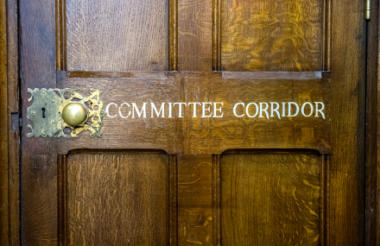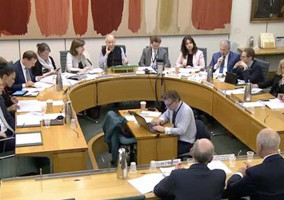Claire Bogue, senior learning projects officer at UK Parliament, says that committees want to hear from charities, and explains what they find helpful and unhelpful to receive from them.
What do Katie Price, Mark Carney and Angelina Jolie all have in common? They have all given evidence to UK Parliament Select Committees. But engaging with parliamentary committees is not the preserve of the high profile: committees want to hear from civil society organisations like yours that have real experience and insight of the issues at hand.
How Select Committees work
A large part of the work of both the House of Commons and the House of Lords takes place away from the debating chambers in select committees. You’ll find a much more consensual approach to the work here, as committee members work across party lines to conduct in-depth scrutiny of the work of government departments, and their arm’s length bodies, as well as delving into more topical and cross-cutting issues.
Select committees generally work by an investigatory process – gathering evidence, collecting data, and interviewing witnesses. By basing their findings on the evidence they have seen and heard – rather than simply on the ‘party line’ – a committee’s report has genuine weight. Any recommendations put forward as part of a final report have the cross-party backing from its members so they can be seen as a credible and workable solution to an issue.
Who committees want to hear from
Engaging with a select committee inquiry is one way for civil society organisations to influence the debate and potential future policy on an issue. Which select committees you choose to follow will depend on the focus of your organisation. However, all committees issue their open ‘calls for evidence’ online and this is a good starting point to see whether your organisation, or the people engaging with you, could add insights and personal experiences to a committee’s body of evidence.
As well as hearing from national organisations, think-tanks or academics, select committees want to hear from people with experience of the key issues and services - the people who could potentially be affected by any recommendations they make. They actively want to hear a diverse range of perspectives, so they are as interested in hearing the views of staff on the ground as they are the experience of those in the boardroom. Examples of this approach can be seen in the House of Lords Communications Committee's inquiry on ‘Growing up with the internet’ which held informal discussions with children and young people. Or in the House of Commons, Women and Equalities Committee’s inquiry into Disability and the Built Environment, where evidence was heard from disabled people, disability charities, built environment professionals, and representatives of local authorities.
Often it is the finer details, the personal stories, and the range of voices that can add depth to the inquiry and give its recommendations more force. But it is important to remember that committees can’t take up individual cases in the same way that a constituency MP might do.
What committees find helpful from charities
A committee can’t accept evidence on general aspects of an organisation’s work, so at the outset they will define the specific terms of their inquiry in an Open Call for Evidence.
This call for evidence will usually outline a series of key questions to which the committee are seeking responses, and it is these questions which enable an organisation, or an individual, with specific expertise or experience to really focus their response. Even if you only have experience of one aspect of an inquiry you may provide a different point of view, so it’s still worth responding and sharing your unique perspective.
Submitting written evidence is simple - it’s usually just a matter of filling out an online form and uploading a word document with your evidence. Including a summary of your evidence, and ensuring it is original, concise, and includes paragraph numbers will also help to give your evidence more impact.
Based on the evidence they receive, a select committee will then invite various organisations and individuals to come to Parliament to give oral evidence. Though it may seem a little daunting, this is an opportunity to explore and expand on the evidence submitted in writing.
And if you need any convincing that engaging with select committees can make a real difference to people’s lives, then look no further than the Homelessness Reduction Bill Inquiry. Using a unique approach, the Communities and Local Government Select Committee gathered written and oral evidence submitted by charities and organisations working with homeless people to inform and rework draft legislation into a Bill which eventually became law in 2017.
Find out more about the work and role of select committees in a free online course starting 5 March. UK Parliament Explored: the Work and Role of Select Committees hosted on FutureLearn, the social learning platform. Find more information on how to submit evidence to a select committee inquiry here.
Claire Bogue is senior learning projects officer at UK Parliament
Related articles











